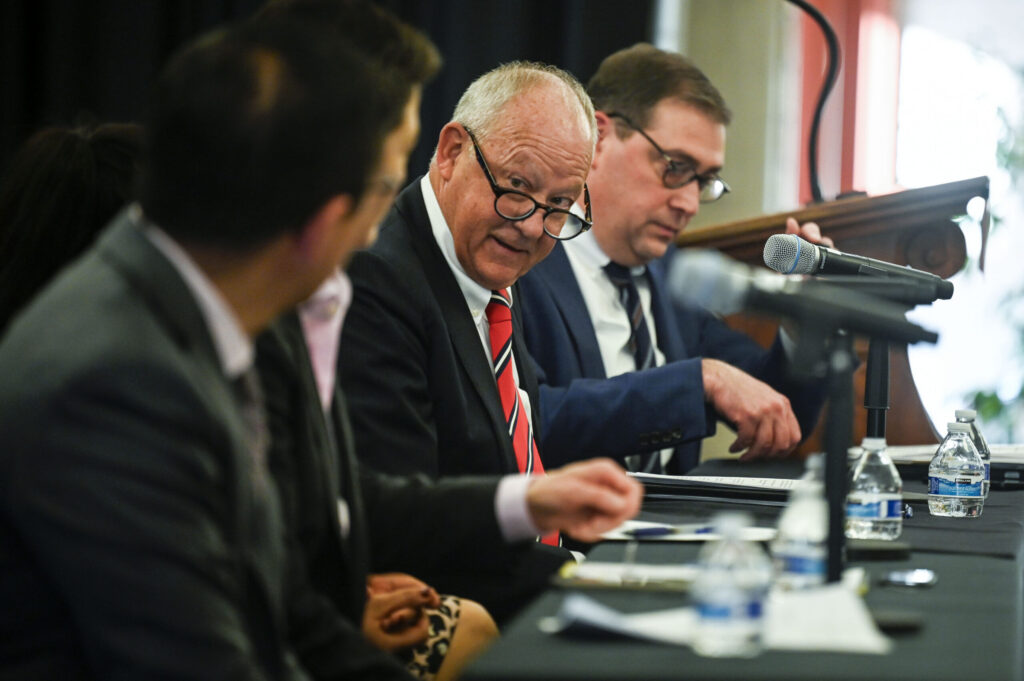Private judges suppress cases at greater rate than regular courts
Private judges hired to handle divorce cases in Colorado suppress them from public view at far greater rates than in cases that rely on district court judges, leaving some legal experts wondering whether affluent clients are simply buying their way into secrecy.
The newspaper found that some private judges have suppressed cases nearly routinely, while having barely utilized that tool when they served on the district court bench.
Said attorney Suzanne Griffiths about suppressing cases from the public: “What if you accuse your spouse of all sorts of bad behavior? Anyone can read it and it’s public record. Private judges are more inclined to suppress than a public judge. Otherwise, anyone with $15 can read your pleadings.”
The cases suppressed included high-profile people, such as world-famous musician James Hetfield, the founder and lead guitarist of the rock band Metallica, elected officials like Douglas County Commissioner Abraham Laydon, high-level government employees, such as Colorado Deputy Attorney General Steven Kaufmann, and the former U.S. ambassador to Austria, Alexa Wesner.
The Judicial Department said through a spokesperson that a private judge’s decision to suppress a case is their own and offered no opinion on whether the public should be able to view the order or reasons for a suppression.
“Judges review the parties’ requests to suppress records and exercise their discretion in determining whether such requests should be granted,” the department said. “The Department takes no position on whether the suppression of records in specific cases or by specific judges is appropriate.”
In several instances, cases were suppressed despite orders of protection that were issued as a result of domestic violence. Divorce lawyers said there is no requirement for attorneys or judges to report domestic abuse to law enforcement unless a child is involved.
One case The Denver Gazette found that was shielded from public view ended with the husband fatally gunning down his wife a day before the private judge they hired was to finalize their divorce.
David Lechner was convicted in April 2024 of murdering his soon-to-be ex-wife, Tracy Lechner, outside her home in Arapahoe County. He was sentenced to life in prison. Their divorce case was being handled by private judge Robert Hyatt. The case had been, and remains, suppressed since January 2020.
Records show that nearly half of all the suppressions were made by the same appointed judge — Angela Arkin — a former Arapahoe County district judge who, The Denver Gazette found, hardly suppressed any cases in a 14-year career on the bench through her retirement in 2016, records show.
In all, Arkin suppressed 60% of the cases she was hired to handle as a private judge — a rate that was unmatched by any judge, whether in full-time district court or retired, across Colorado in at least the last 15 years.
That left some experts wondering whether litigants could intentionally hire judges with high rates of suppression to handle their divorce because the odds were far better their case would be suppressed than with someone else.
“I believe if you look at my website, under appointed judges, you will see that I say cases presided over by an appointed judge are not more private than a public courtroom,” said C. Jean Stewart, the former presiding judge of Denver Probate Court. Stewart doesn’t accept appointments in domestic relations cases and has not received any appointment to be a private judge in the years reviewed by The Denver Gazette.
“I don’t understand how litigants can be promised absolute privacy in advance in every case,” Stewart said. “The rules allow some sensitive portions of some cases to be sealed from public view under specific circumstances and I occasionally allowed litigants to redact or conceal certain facts, allegations or numbers, but the whole of the case? It’s rare, and when done without specific factual findings, inconsistent with our law.”
Arkin said she has not suppressed a case without justification.
“I have only ever suppressed cases pursuant to a stipulation of all parties, and in accordance with Colorado law,” she said in an email to The Denver Gazette.
But The Denver Gazette found there’s no way for the public to check.
Public court means public access
Experts say public access to the courts is a foundation of America’s justice system.
“The public justice system is generally public in a way that’s reasonable and open to all,” said Eli Wald, a law professor at the University of Denver Sturm College of Law. “Our judicial system is in open court and the public can come and sit and observe, and decisions are made in public and are accessible.”
He said that “a key concern” to the private judge system is “any suggestion that those who can afford it can literally purchase private justice, while many don’t have the money. The question is whether to allow for the purchasing of better service.”
In virtually every case that was suppressed, the litigants telegraphed that desire long before the private judge was even appointed, The Denver Gazette found.
Litigants are required to submit to the chief justice of the Colorado Supreme Court a joint request to appoint a judge to their case. In it they must detail the reasons for that request.
While nearly all of the requests for a private judge declared that “judicial economy,” “judicial and litigant economy,” or a need for “expediency” was the root reason, a greater majority said their desire was specifically for their privacy, records show.
The divorce is “complex and the parties would like their privacy, as well as the privacy of their families and business associates to be protected,” read several petitions. Still others said simply that “the parties respectfully request their privacy.”
Griffiths and her law firm, Griffiths Law in Lone Tree, have retained a private judge more than any other in Colorado, records show. At least a half dozen of her cases have been suppressed, also tops.
Privacy for her clients — especially those who can afford it — is critical.
“You can go to divorce court and read all sorts of things about people’s lives, and those of high worth are concerned for their safety and their privacy,” Griffiths said. “You can accuse a CEO of being a sexual abuser. They don’t want anyone to know of it. True or not, it’s their private business. They don’t want it shown to the world. They don’t want their intimate details in the newspaper.”
Some law firms openly advertise the use of private judges will nearly guarantee clients won’t have meddling strangers.
“Rather than litigating your divorce in a public court, where your financial disclosures and other potentially sensitive matters are out in the open, you can resolve your divorce in a private setting,” according to the website for Denver lawyers Ciancio Ciancio Brown. “You (can) even hold … hearings in the comfort of your own home, if desired.”
The website for another law firm, Ammarell Deasy, said private judges “automatically increase the level of privacy around your divorce.”
“This can be to your advantage if you’re concerned about being spotted going in or out of the courthouse,” the law firm’s website reads. “This can be particularly important if you’re a local celebrity or have a professional practice you want to protect from gossip.”
Advocates for open courts who focus on family law said there’s a danger to easily secreting cases away from the public eye.
“The pressures are exacerbated when there is no light, that if something is closed up, people can do what they want,” said Natalie Blundell, director of WeSpoke in New York City, a nonprofit that pushes for women’s rights in family courts nationwide. “If no one is looking, it’s amazing what humans will do. There’s no one reading through the transcripts or sitting in court, the impact to the family and children is for the rest of their lives.”
What’s more, the judge’s order and the underlying request to suppress a civil case in Colorado are also kept from the public, so there’s no way to determine why a matter is being kept secret in the first place — or whether the reasons behind it are even valid.
In one case in Routt County, The Denver Gazette in December filed a formal request to review the suppression order and the lawyers’ request to keep it out of public view. Not only did the newspaper meet with resistance from the litigants, the judge — Angela Arkin — denied the newspaper’s request. The newspaper has asked Arkin to reconsider that decision.
One of the lawyers in the case said in an email that he thought it was merely a reporter “trolling” civil cases in order to find something interesting.
In an Arapahoe County divorce, The Denver Gazette sought to confirm only the name of the private judge who had issued a pair of orders but was denied because the case was suppressed.
‘You’d never know’
“Some of these cases could involve matters of public interest, but you’d never know it if the records are suppressed and you can’t even see why that is,” said Jeff Roberts, executive director of the Colorado Freedom of Information Coalition. “Courts and court records are supposed to be open, unless there are compelling reasons to close them, so that people can know whether courts are fair and working well.”
The Denver Gazette has learned that at least a handful of the cases suppressed by private judges occurred without any of the litigants even requesting it, a move known as sua sponte, where a judge makes the determination on their own.
Such moves are prohibited in some states that also allow for private judges.
In California, for example, a private judge cannot suppress or seal a case on their own. That is determined only by the original district court judge assigned to that case or the presiding judge.
“Where there is no light in the dark underworld of ‘privacy’ (i.e. suppressed cases), unchecked power reigns over founded domestic violence,” according to a woman whose Colorado divorce case was quickly suppressed by a private judge over her objections. She agreed to speak about her pending case only if she remained anonymous because she said she fears for the custody of her children.
She added: “Where there is money, there is always power and collusion and secrecy.”
In at least one other divorce case, The Denver Gazette found a private judge had overturned a sitting district court judge’s earlier order that refused to suppress it. Following the first judge’s ruling, the litigants quickly hired a private judge, the Supreme Court’s chief justice approved that appointment, and the new jurist suppressed the case within two weeks, records show.
“There was no underlying motion to suppress my case,” said a woman whose divorce case was suddenly suppressed despite her objections. She agreed to discuss her experience only if her name was withheld because she feared repercussions. “The judge simply did it on their own and said both sides agreed it’s in the best interest to suppress. I did no such thing.”
A 2024 survey by Project Justice Colorado found that 84% of respondents feared retaliation for speaking out about their family court experiences, “highlighting a culture of intimidation and silencing within the system.”
The Colorado Supreme Court, whose chief justice is responsible for appointing all the private judges, in December 2020 approved a new rule for suppressing criminal cases following newspaper stories that revealed thousands of cases remained locked away under suppression orders that were also kept secret.
But while the directive, known as Rule 55.1 and in effect since May 2021, ensures at least a judge’s suppression order and the reasons behind it would be public, it does not apply to civil matters such as divorce cases.
Prior to Rule 55.1, there were no real rules or laws that applied to suppressing criminal cases, but there was plenty of precedent for sealing civil matters.
Suppression was supposed to be a rare occurrence and for a specific limited amount of time. And the judges who suppress civil cases not only must give the nature of the limitation in their order but cite the precise reason why.
Simply saying that a court file — not just a specific record within that file — contains information that is “extremely personal, private and confidential” or could have “prospective injury to reputation” is insufficient reason, the Colorado Supreme Court determined in 1996.
But the public cannot see why suppressed civil cases in Colorado, like the dozens of divorce cases suppressed by private judges, are closed. It would take a special court ruling to open a judge’s suppression order, such as The Denver Gazette learned when it requested a copy of Arkin’s order in Routt County.
“The law is clear. Even if they want their affairs out of the public eye, it isn’t sufficient to keep the public from inspecting judicial records,” said First Amendment lawyer Steve Zansberg. “Not allowing access to even the suppression order makes no sense either. If they do want privacy, they have all kinds of alternative dispute resolutions that are private, such as arbitration.”
Zansberg pointed to a 2000 federal appeals court case from Illinois that pointedly quoted another from 1994, saying if litigants want privacy, go to arbitration, not the courts.
“People who want secrecy should opt for arbitration,” the appeals court wrote in Union Oil Co. of California v. Leavell. “When they call on the courts, they must accept the openness that goes with subsidized dispute resolution by public (and publicly accountable) officials. Judicial proceedings are public rather than private property.”
The Denver Gazette did get a rare look at the reasons why a litigant would want their divorce case suppressed and why the district court judge denied it.
Breann Battle filed a petition in late 2017 to allocate parental responsibilities of her daughter with the child’s father, former Denver Nuggets defensive stalwart Kenneth “Manimal” Farried-Lewis II.
In it, Battle said because of Farried-Lewis’ standing as a public figure, any access to their court file “may be used in a scandalous and inappropriate manner” that would draw unnecessary notoriety to the child.
The petition also noted that public access to the basketball player’s “contracts and other business interests” should be protected, and that all personal information should be kept private even though the lawyers were already diligent about that.
The district court judge on the case at the time, Kenneth Laff, denied the motion in November 2017, saying Battle’s argument that “the parties have substantial assets and prominent standing in the Denver community and that, consequently, the parties are concerned about their privacy” wasn’t enough to suppress the case. Besides, some information was, by routine, already kept confidential.
“These conclusory statements do not provide sufficient factual basis to overcome the strong presumption in favor (of) public access to court records, especially where, as here, any separation agreement or sworn financial statement filed in the case will not be accessible to the public,” Laff wrote.
The case remained unsuppressed and Battle and Farried-Lewis hired a private judge in May 2019.
Battle filed a second family court case in Los Angeles County Superior Courts in July 2021, records there show. Her Colorado case was closed in July 2022.
Cases that are suppressed in Colorado, however, remain shrouded in secrecy, including the private judges’ reasonings for keeping them that way.
“There’s no accountability, no transparency,” said Maralee McLean, an advocate for family court reform through Moms Fight Back. “The bottom line is there’s a lot of money, huge money, to be gotten and you can escape behind attorneys and private judges.”












